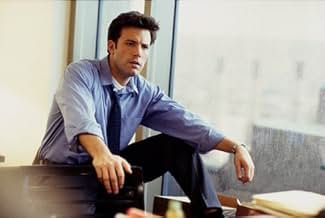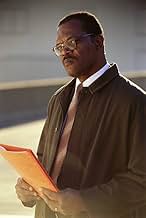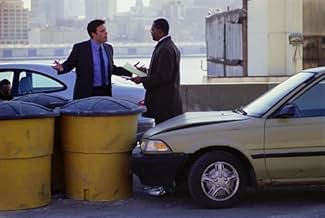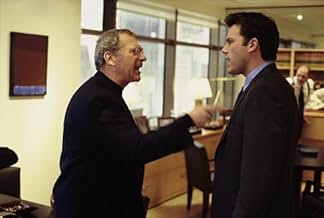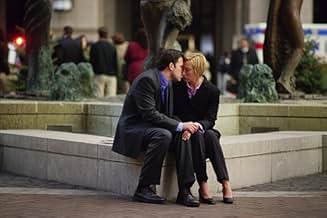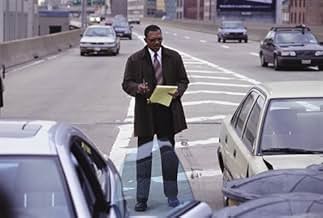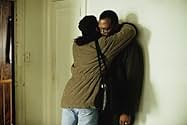Die Geschichte dessen, was eines Tages in New York City passiert, als sich ein junger Anwalt und ein Geschäftsmann auf dem F.D.R. Drive einen kleinen Autounfall teilen und ihre gegenseitige ... Alles lesenDie Geschichte dessen, was eines Tages in New York City passiert, als sich ein junger Anwalt und ein Geschäftsmann auf dem F.D.R. Drive einen kleinen Autounfall teilen und ihre gegenseitige Wut im Straßenverkehr zu einer Fehde eskaliert.Die Geschichte dessen, was eines Tages in New York City passiert, als sich ein junger Anwalt und ein Geschäftsmann auf dem F.D.R. Drive einen kleinen Autounfall teilen und ihre gegenseitige Wut im Straßenverkehr zu einer Fehde eskaliert.
- Auszeichnungen
- 7 Nominierungen insgesamt
- Mina Dunne
- (as Jennifer Dundas Lowe)
- Gina Gugliotta
- (as Lisa Leguillou)
Empfohlene Bewertungen
What happens next would depend on the individuals involved and given the volatile nature of these individuals , it seems inevitable that one or both will blame the other for their problems that result from the collision and seek to strike back at the other to get revenge. This may sound immature and childish, but it is also frighteningly believable.
Most people may be very calm and rational most of the time, but when they believe that they have been provoked or wronged by another, reason and passion fly out the window and are replaced by anger, rage and throughts of revenge. Events quickly spiral out of control. Changing Lanes was very entertaining and very unpredictable in its depiction of the lengths that both characters go to in order to strike back at the other. Ben Affleck and Samuel Jackson give first rate performances.
Affleck plays the role of the oddly named Gavin Banek (did they take the name Ben Affleck', throw it in a blender, and add some new letters for good measure?), a high-power lawyer on the verge of becoming one of the partners at his law firm, alongside his father-in-law. Jackson is Doyle Gibson, a reforming alcoholic father of two clawing his way out of his hole and trying to save his marriage. On a critical day in both their lives, Doyle going to court to try winning joint-custody, and Gavin on his way to seal his career-making case, the two get into a minor accident on the FDR turnpike, causing Doyle to miss his hearing and Gavin to accidentally give Doyle a signed document that is critical to his case and it all unravels from there.
The two tumble in a daylong haze of malice and self-destruction, sabotaging each other's lives. Whenever either decides to throw in the towel and do the right' thing, it is too late and the other has already escalated it to the next level. His life quickly falling down around him, Gavin begins to examine it for the first time, taking a deep look into his wife, his law firm, his boss/father-in-law, and himself ultimately questioning his motivation for trying to retrieve the document in the first place.
This is where the film really shines: many movies ask the question what makes a man?' but `Changing Lanes' does it with honestly and authenticity. The screenplay, by Chap Taylor, asks if it is success, or if its providing for one's wife and kids, or if its true goodness, avoiding superficiality and delving into the motivations for each. In one telling monologue, Gavin's father-in-law, played with perfect tone by Sydney Pollack, says, `At the end of the day, I do more good than harm. What other standard have I got?' Unfortunately, the movie does not really ask the question of what makes a woman, even though both wives show real strength. The movie does not even seem to suggest that Gavin and Doyle's struggles could even be applied to women (obviously they could, had the movie explored that).
Jackson, always an excellent actor, is great as Gibson even if he has performed better before. Surprisingly, in this film Affleck's acting actually seems to surpass Jackson's in this amazing performance that is probably the best we have seen from Affleck so far.
All of the characters in the film, including minor-roles and extras, all exhibit a very human feel, and seeing real-feeling people on the screen has always been something rare and not to be taken for granted. The viewer comes to care about everyone in the picture: Gavin, Doyle, their wives, the guy at the bank, even the stranger at the bar.
New York City itself is alive in this movie: it breathes, coughs, and gasps with Salvatore Totino's shaky, unsaturated, claustrophobic photography. Totino really looks at people and the city in the face, and does not try to make them prettier or uglier than they are. David Arnold's original electronic score is a refreshing change from the very poor attempts at orchestral music that most movies are now filled with. Arnold's score very effectively sets the mood and reinforces the tempo of the movie.
`Changing Lanes' is a success for Roger Michell that shows us that a movie can have major stars, be entertaining, glossy, substantial, and pensive all-at-once.
`Changing Lanes' is rated R for a fender-bender, destruction of office equipment, unseen infidelity, a shot of the World Trade Center, and honest depiction of the human condition.
The story is slow-paced but this works in the film's favour, building up a realistic picture of life in New York and carefully developing the characters along the way. There are many twists and surprises in the cat-and-mouse game played out between the two men, and it's never quite possible to predict the outcome for this is an edgy, sometimes unsettling movie. In the end things do get a bit preachy and syrupy, but this doesn't matter, because the film's message is a strong one and the dialogue is not spoon-fed to the audience, a failing of so many modern films. Instead this is a film that doesn't underestimate the viewer, that is worth a look thanks to being so unconventional and intelligently-written and made.
There are three main reasons why I checked out this movie: Samuel, L, Jackson. Needless to say, he's a terrific actor and worth seeing in whatever he does. He's one of my favorites, and he delivers another powerhouse performance, taking on a role somewhat different from his recent roles: he plays an average Joe. We're introduced to his character, Doyle Gibson, who's a very nice guy simply haunted by mistakes in his past, one being alcoholism, which led to a divorce. And now he's attending AA meetings and buying a house for his two kids, hoping he will attain custody of them. Ben Affleck is good and charismatic. I didn't sympathize as much with his character, but that doesn't make him an antagonist. Neither characters are saints, nor are they sinners. That's good, because it's never completely effective to include characters who are entirely sympathetic. They're both mature adults, but they resort to juvenile acts of revenge in hopes that they can undo what happened. Sydney Pollack is great, as Affleck's egotistical father-in-law, proving his talents in front of the camera are just as fine as his talents behind the camera. I wanted to see more of the beautiful Amanda Peet, but she only has approximately 7 minutes of screen time. So I'm guessing that topless scene I heard mentioned didn't make it to the final cut. Oh, well. William Hurt, who seems to do a movie every 5 years, unfortunately has a small, thankless role as an alcohol counselor.
The script is well-written, and the film is a lot more character-driven than ones of recent years. I loved that scene in the bar where Sam Jackson sits in a lonely bar, listening in on two white guys badmouthing Tiger Woods. He lashes back with a terrific monologue, and later ends up punching them out. Some directors would've cut that scene out, overly concerned about the film's pacing, but I'm glad this time that wasn't the case. However, the ending seems a little fake. It's just too happy for its own good. But that's the only element of the movie I found forced.
My score: 7 (out of 10)
Wusstest du schon
- WissenswertesA day after the terrorist attacks of September 11, 2001, director Roger Michell had the World Trade Center towers digitally removed from the opening main title sequence in the film. In the DVD commentary, he admitted that it was a mistake to erase them, and make it appear as if they did not exist. During the re-editing of the film, Michell reinserted them as a tribute.
- PatzerWhen Gavin Lights the paper on fire and raises it to the sprinkler head, that type of sprinkler head would only discharge the water. No other heads would spray water. The reason for this is to minimize damage.
- Zitate
Doyle Gipson: I hope you don't mind, but I was intrigued by your conversation. I just thought you were in advertising. So I want to give you my dream version of a Tiger Woods commercial, okay? There's this black guy on a golf course. And all these people are trying to get him to caddy for them, but he's not a caddy. He's just a guy trying to play a round of golf. And these guys give him a five-dollar bill and tell him to go the clubhouse and get them cigarettes and beer. So, off he goes, home, to his wife and to their little son, who he teaches to play golf. You see all the other little boys playing hopscotch while little Tiger practices on the putting green. You see all the other kids eating ice cream while Tiger practices hitting long balls in the rain while his father shows him how. And we fade up, to Tiger, winning four Grand Slams in a row, and becoming the greatest golfer to ever pick up a 9-iron. And we end on his father in the crowd, on the sidelines, and Tiger giving him the trophies. All because of a father's determination that no fat white man - like your fathers, probably - would ever send his son to the clubhouse for cigarettes and beer.
- Crazy CreditsThanks to the staff and Militia Force members and veterans at the Marcy Avenue Armory, Brooklyn, New York.
- Alternative VersionenThere was an early review of the movie that contained a spoiler of the ending. The ending that was originally used involved Ben Affleck and Samuel L. Jackson getting into a fist fight that leads onto the balcony. They talk about right and wrong and Affleck takes the file and tears it up and the movie fades to credits. This ending was most likely cut because test audiences did not like it. It will most likely appear on the DVD. Also a small clip shown in the TV ads shows Affleck and Jackson fighting on the balcony. This was part of the original ending which explains why it was cut.
- VerbindungenFeatured in Changing Lanes: The Writer's Perspective (2002)
Top-Auswahl
- How long is Changing Lanes?Powered by Alexa
Details
- Erscheinungsdatum
- Herkunftsland
- Sprache
- Auch bekannt als
- Fuera de control
- Drehorte
- Produktionsfirmen
- Weitere beteiligte Unternehmen bei IMDbPro anzeigen
Box Office
- Budget
- 45.000.000 $ (geschätzt)
- Bruttoertrag in den USA und Kanada
- 66.818.548 $
- Eröffnungswochenende in den USA und in Kanada
- 17.128.062 $
- 14. Apr. 2002
- Weltweiter Bruttoertrag
- 94.935.764 $
- Laufzeit1 Stunde 38 Minuten
- Farbe
- Sound-Mix
- Seitenverhältnis
- 2.35 : 1


